by [email protected] | Feb 21, 2024 | Enjoying Cash Flow
Podcast: Play in new window | Download
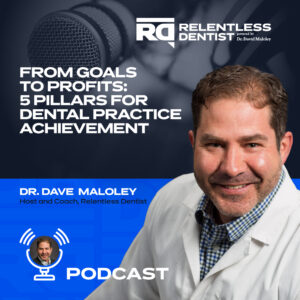 Are you a dental practice owner ready to level up, but unsure where to start? What if the key to success lies in five proven strategies?
Are you a dental practice owner ready to level up, but unsure where to start? What if the key to success lies in five proven strategies?
Many practice owners feel lost, with either vague goals or so many they become overwhelming. But by focusing on five core principles, you can achieve the growth and fulfillment you desire. Let’s unlock your potential and make success inevitable.
In this episode, Dr. Dave discusses five hidden principles that’ll help you crush your business goals. He distills the essence of achieving beyond the ordinary with strategies that blend ambition with actionable wisdom.
- Future Identity Alignment: Explore how envisioning your ideal self can serve as a compass, guiding your steps toward significant success and ensuring your goals are not just met but exceeded.
- Passion-Driven Goals: Uncover the strategy of pursuing goals that deeply resonate with your curiosities and core passions, guaranteeing sustained motivation and deeper satisfaction in your professional journey.
- Empowerment Through Mastery: Dive into the concepts of personal influence and time management as critical tools for overcoming challenges, ensuring progress, and realizing your financial aspirations.
This episode is dedicated to dental practice owners aiming to transform their goals into tangible successes. Listen now to lay the groundwork for a future where your practice not only grows but flourishes beyond expectations.
Take the next step towards transforming your dental practice. Take Dr. Dave’s Dentists Ascend Quiz to discover the hidden potential in your business.
Key Quotes:
- “What if I told you that the secret to crushing your business goals isn’t just hard work, but five game-changing strategies that the most successful business owners swear by?”
- “When a goal is rooted in intrinsic value, it resonates with your core passions and interests, ensuring that the journey towards achieving this goal is as rewarding as the destination itself.”
- “Utilitarian value encompasses the tangible outcomes and the practical benefits derived from achieving business objectives…”
- “The concept of bandwidth belief addresses the common hurdle that we face, the perception of not having enough time.”
- “The principle of personal control and influence is a cornerstone of achieving substantial business goals.”
Featured on the Show:
- I appreciate your feedback. Let me know what you learned and loved here: [email protected].


by [email protected] | Feb 14, 2024 | Enthusing Clients
Podcast: Play in new window | Download
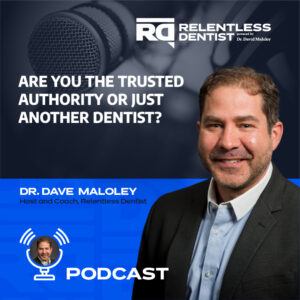 Do you want to be the go-to dental expert in your community? The kind of dentist do patients trust implicitly and rave about their friends?
Do you want to be the go-to dental expert in your community? The kind of dentist do patients trust implicitly and rave about their friends?
Most dentists have clinical skills, but many struggle to build genuine authority and the kind of patient loyalty that leads to a thriving practice. Today, we’re exposing those subtle ways dentists accidentally undermine their own credibility. By being aware of these pitfalls, you’ll strengthen your authority, elevate patient experiences, and create a practice that flourishes.
Dive into an eye-opening discussion where Dr. Dave explores unnoticed actions that may be compromising your position as a trusted dental authority. This episode is packed with essential takeaways:
- Crucial Mistakes: Identify the common oversights that dentists make, negatively affecting their professional image, credibility, case acceptance, and revenues.
- Trust Builders: Learn actionable strategies to strengthen your relationships with patients and enhance their experience.
- Keys to Authority: Gain insights into the core practices and communication skills that establish you as a leading figure in dentistry.
Don’t miss out on this opportunity to refine your approach and solidify your status as a trusted authority in the field. Listen now!
Take the next step towards transforming your dental practice. Take Dr. Dave’s Dentists Ascend Quiz to discover the hidden potential in your business.
Key Quotes:
- ”Trusted authority in dentistry is achieved when patients walk away not just with healthier smiles but with the confidence that their dentist truly has their best interests at heart.”
- “Trust is built when someone is vulnerable and not taken advantage of.”
- “Effective time management ensures that each patient receives the attention that they deserve, enhancing the quality of care, and demonstrating a dentist’s organizational skills and respect for their patients’ needs and time.”
- “Open and honest communication, even in these challenging situations, is vital for maintaining trust and respect.”
- “Leading by example is a powerful way to inspire trust and respect, demonstrating a personal commitment to those standards of care recommended to your patients.”
Featured on the Show:
- People: Bob Vanourek, now enjoying retirement, previously led five companies as CEO, spanning from startups to a $1 billion enterprise listed on the New York Stock Exchange.
- People: Charlie Munger, was a brilliant investor, businessman, and philanthropist who served as Warren Buffett’s long-time partner and Vice Chairman of Berkshire Hathaway, known for his sharp intellect and emphasis on value investing.
- Book: Triple Crown Leadership: Building Excellent, Ethical, and Enduring Organizations, Bob Vanourek
- I appreciate your feedback. Let me know what you learned and loved here: [email protected].


by [email protected] | Feb 7, 2024 | Enhancing Culture
Podcast: Play in new window | Download
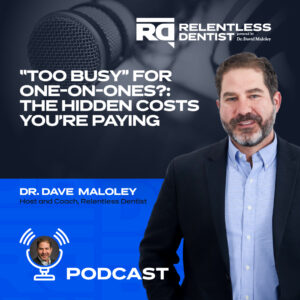 Are one-on-one meetings with your team just another item on your to-do list, or are you maximizing the potential of one-on-one meetings in your dental practice? This episode is a deep dive into how these crucial interactions can be a game-changer for creating a self-managing, efficient, and growth-oriented team.
Are one-on-one meetings with your team just another item on your to-do list, or are you maximizing the potential of one-on-one meetings in your dental practice? This episode is a deep dive into how these crucial interactions can be a game-changer for creating a self-managing, efficient, and growth-oriented team.
- The Untapped Potential: Discover how effective one-on-one meetings build trust and efficiency while neglecting them can lead to serious consequences like reduced engagement, communication breakdowns, and a lack of team cohesion.
- Navigating the Pitfalls: Learn about the detrimental effects of poorly conducted meetings, including stunted professional development and increased staff turnover, and how to transform these challenges into opportunities for growth.
- A Roadmap to Success: Gain insights into the principles of impactful one-on-one meetings, focusing on regularity, core values, active listening, and crafting actionable growth plans.
Don’t let another day pass without harnessing the power of one-on-one meetings. Listen now to upgrade your dental practice and pave the way for a more prosperous future.
Take the next step towards transforming your dental practice. Take Dr. Dave’s Dentists Ascend Quiz to discover the hidden potential in your business.
Key Quotes:
- “Feeling disrespected at work is now the number three reason people quit their job.”
- “We as employers need to create space where our employees are heard.”
- “One-on-one meetings are key opportunities for feedback and growth.”
- “A lack of regular quality interactions between the owner and their employees will directly lead to high turnover rates.”
- “By centering discussions on core values, you provide a compass for decision-making and teamwork.”
Featured on the Show:
- People: Michael Lopp, is an engineering manager based in Silicon Valley, known by his pen name and alter ego, Rands. He is recognized for his blogging, management in software engineering, and authorship of webcomics.
- People: Kim Scott, co-founder of an executive education firm and the workplace comedy series “The Feedback Loop” inspired by her perennial bestseller “Radical Candor: Be a Kickass Boss without Losing Your Humanity,” has served as a CEO coach at notable tech companies such as Dropbox, Qualtrics, and Twitter.
- Book: Managing Humans( Biting and Humorous Tales of a Software Engineering Manager), Michael Lopp
- Book: Radical Candor: Fully Revised & Updated Edition: Be a Kick-Ass Boss Without Losing Your Humanity, Kim Scott
- I appreciate your feedback. Let me know what you learned and loved here: [email protected].


by [email protected] | Jan 31, 2024 | Elevating Practice Owner Confidence
Podcast: Play in new window | Download
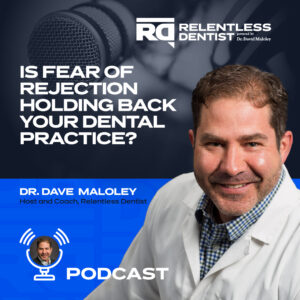 Are you a dental practice owner haunted by the fear of patient rejection? Are you ready to redefine your approach to rejection and unlock new levels of success in your dental practice? Let’s tackle the fear of rejection head-on.
Are you a dental practice owner haunted by the fear of patient rejection? Are you ready to redefine your approach to rejection and unlock new levels of success in your dental practice? Let’s tackle the fear of rejection head-on.
Imagine transforming that fear into a stepping stone for professional success. We’ll dive deep into understanding why this fear is so prevalent among dentists and provide you with five transformative strategies. Learn how to face rejection with poise, turning it into a powerful force for growth and positive change.
- The Hidden Impact: Discover how the fear of rejection subtly influences both the professional and personal aspects of dental practice. Unearth the underlying factors that give rise to this common yet unspoken challenge.
- Transformative Strategies: Dive into five empowering techniques designed to overcome the fear of rejection. Learn about building resilience, nurturing self-compassion, and reshaping negative perceptions.
- Embrace for Growth: View rejection from a new perspective. Explore how accepting and learning from rejection can be a powerful catalyst for personal and professional growth in dentistry.
Tune in now for insights that will redefine your approach to challenges and open doors to greater success as a dentist.
Take the next step towards transforming your dental practice. Take Dr. Dave’s Dentists Ascend Quiz to discover the hidden potential in your business.
Key Quotes:
- “What if you could face rejection with confidence, knowing it’s a stepping stone, not a setback?”
- “The fear of rejection can wreak havoc on how you communicate and make decisions.”
- “This fear is deeply rooted in our biological and evolutionary history.”
- “Negative experiences like bullying, parental neglect, or peer rejection heighten our sensitivity to rejection even as we become adults.”
- “Our fear of rejection is often magnified by our own critical inner voice.”
Featured on the Show:
- People: Bronnie Ware, an Australian writer, musician, and inspirational speaker, is renowned for her insights on the most common regrets people express on their deathbeds which she detailed in her book “The Top Five Regrets of the Dying.
- People: Jia Jiang, is a multifaceted entrepreneur, author, speaker, and blogger, known for founding Rejection Therapy, a platform dedicated to offering resources, insights, and products designed to help individuals conquer their fear of rejection.
- People: Robert Greene, is a renowned American author celebrated for his works on strategy, power, and seduction. His writing portfolio includes six globally acclaimed bestsellers: “The 48 Laws of Power,” “The Art of Seduction,” “The 33 Strategies of War,” “The 50th Law,” “Mastery,” and “The Laws of Human Nature.
- People: Harvey Mackay, is a renowned American entrepreneur, columnist, and author. His widely syndicated column, known for its career and motivational guidance, appears in over 100 newspapers. Mackay has written seven books that have achieved bestseller status on the New York Times list, with three reaching the number one position.
- Book: The Top Five Regrets of the Dying: A Life Transformed by the Dearly Departing, Bronnie Ware
- Book: Rejection Proof: How I Beat Fear and Became Invincible Through 100 Days of Rejection, Jia Jiang
- I appreciate your feedback. Let me know what you learned and loved here: [email protected].


by [email protected] | Jan 24, 2024 | Elevating Practice Owner Confidence
Podcast: Play in new window | Download
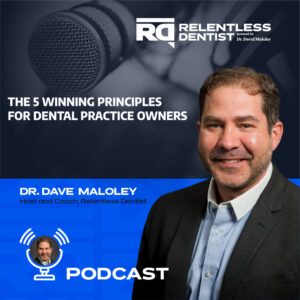 Imagine you’re at a crossroads in your dental practice. How do you move from just being good to truly exceptional? Let’s unlock the secrets of thriving in the competitive world of dentistry.
Imagine you’re at a crossroads in your dental practice. How do you move from just being good to truly exceptional? Let’s unlock the secrets of thriving in the competitive world of dentistry.
Ever pondered what ‘Winning’ truly means in the realm of dental practice ownership? In this episode, inspired by Tim Grover’s book ‘Winning: The Unforgiving Race to Greatness,’ Dr. Dave delves into the art of triumph in your business.
- Redefining Success: Explore how expanding your vision of victory can transform your practice’s trajectory.
- Team and Wealth Dynamics: Unearth the crucial role of team unity and smart financial strategies in driving your practice to victory.
- The Only True Opponent: Learn why facing and overcoming your inner challenges is the ultimate battle for your practice’s triumph.
Don’t just ponder; act. Listen now and embark on a journey to elevate your dental practice to a championship season.
Take the next step towards transforming your dental practice. Take Dr. Dave’s Dentists Ascend Quiz to discover the hidden potential in your business.
Key Quotes:
- “Winning is not just about clinical excellence. It’s about crafting a vision, building an outstanding team, ensuring profitability, and mastering yourself.”
- “Value creation is the ultimate goal. It means going beyond routine procedures to deliver an exceptional experience for each patient.”
- “The owner sets the rules. These rules extend far beyond clinical procedures, encompassing the practice’s values, culture, and patient experience standards.”
- “Team excellence drives victory. Your team’s collective excellence is key to the success of your practice.”
- “The only real opponent is you. Dental practice owners are on a perpetual journey of self-mastery, seeking improvement both professionally and personally.”
Featured on the Show:


by [email protected] | Jan 17, 2024 | Enthusing Clients
Podcast: Play in new window | Download
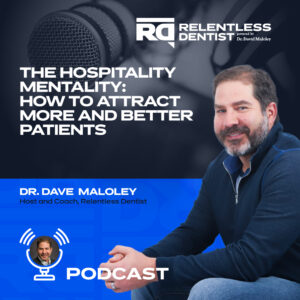 Are you a dental practice owner striving to stand out in a saturated market? What if the secret to success lies not only in your clinical skills but in something more, something often overlooked in healthcare? Imagine transforming your practice by embracing a hospitality mentality, where patient care goes beyond procedures, fostering genuine connections and unforgettable experiences.
Are you a dental practice owner striving to stand out in a saturated market? What if the secret to success lies not only in your clinical skills but in something more, something often overlooked in healthcare? Imagine transforming your practice by embracing a hospitality mentality, where patient care goes beyond procedures, fostering genuine connections and unforgettable experiences.
In this episode, Dr. Dave reveals how embracing the hospitality industry’s standards can benefit you and your practice.
Discover the Power of a Hospitality Mentality:
- Elevate the patient experience.
- Attract a flood of high-quality dental patients.
- Uncover Healthcare Challenges: The current standards often fall woefully short.
- The 10 Tenets of a Hospitality Mentality: These are the keys to 3x your word-of-mouth referrals
Dental practice owners: tune in now and embark on the path toward a healthier, more prosperous practice.
Take the next step towards transforming your dental practice. Take Dr. Dave’s Dentists Ascend Quiz to discover the hidden potential in your business.
Key Quotes:
- “Black and white means you’re doing your job with competence and efficiency. Color means you make people feel great about the job you’re doing for them.”
- “Getting the right plate to the right person, at the right table, is service. But genuinely engaging with the person you’re serving, so you can make an authentic connection? That’s hospitality.”
- “Your dental practice can adopt this hospitality mentality to create an inviting environment that not only retains existing patients but also attracts new high-quality ones.”
- “In the realm of a typical healthcare and typical customer service within healthcare, numerous challenges undermine the patient experience.”
- “By adopting this [hospitality] mindset, you and your team can elevate the patient experience, attract more and better patients, and ultimately drive improvements in our healthcare industry.”
Featured on the Show:


by [email protected] | Jan 10, 2024 | Enhancing Culture
Podcast: Play in new window | Download
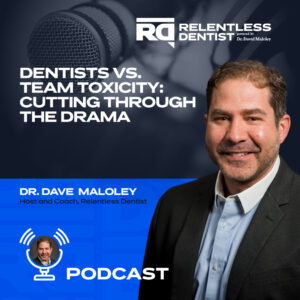 Are you a dental practice owner struggling with hidden challenges within your team? Could the greatest threat to your practice’s success be internal, rooted in team dynamics?
Are you a dental practice owner struggling with hidden challenges within your team? Could the greatest threat to your practice’s success be internal, rooted in team dynamics?
In this podcast episode, we will focus on high performance for you, your team, and your business, guiding you to deliver exceptional patient care while enjoying the financial and time freedom of a high-profit practice. Dive into the enduring principles essential for building a practice and life you’re proud of.
Ready to uncover hidden threats that could shape the destiny of your dental practice?
Join Dr. Dave as he reveals The 6 Warning Signs of Team Toxicity… potential triggers for team turnover, disgruntled patients, revenue loss, and scathing one-star reviews.
- The Subtle Threat: Explore the concealed signals of team toxicity that undermine your practice’s foundation.
- Practice Vitality: Gain insights into how team toxicity can impact your financial success, morale, and patient relationships.
- Solutions Await: Empower yourself with actionable strategies to confront team toxicity, fostering a culture of growth, collaboration, and unwavering professional excellence.
Don’t wait any longer; your practice’s future depends on it. Listen now and embark on the journey toward a healthier, more prosperous practice culture.
Take the next step towards transforming your dental practice. Take Dr. Dave’s Dentists Ascend Quiz to discover the hidden potential in your business.
Key Quotes:
- “The greatest threat to your practice isn’t external, but lies within the dynamics of your dental team.”
- “Confronting team toxicity head-on can not only transform your practice, but it also allows you to work less, worry less, gives you more time off, and allows you to achieve bigger profits.”
- “A powerful mindset is crucial for evolution beyond your current state.”
- “Ignoring the brain’s capacity for change can significantly limit a dentist’s ability to learn and grow, both personally and professionally.”
- “Fear of pushing boundaries and taking action can significantly restrict a practice’s growth and innovation.”
Featured on the Show:
- I appreciate your feedback. Let me know what you learned and loved here: [email protected].


by [email protected] | Jan 3, 2024 | Elevating Practice Owner Confidence
Podcast: Play in new window | Download
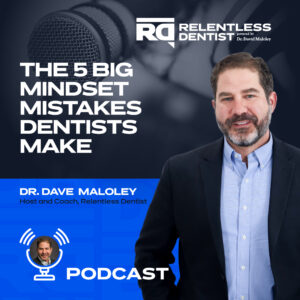 Are you unintentionally holding back your dental practice with old beliefs?
Are you unintentionally holding back your dental practice with old beliefs?
This episode is a game-changer as we will tackle that big question. It’s not just about dental skills or business tricks. It’s about changing how you think to transform your work and life. We dive into how your mindset can shape everything from patient care to how you run your practice.
Prepare to challenge and change the way you think about your dental practice through:
- Fixed Beliefs, Fixed Outcomes: Are unhelpful beliefs constricting your practice’s potential? Learn how embracing flexible thinking can open new doors.
- The ‘Yet’ Factor: Discover the immense power of ‘yet’ in transforming perceived limitations into opportunities for growth and success.
- Brain’s Untapped Potential: Explore how leveraging neuroplasticity can revolutionize your skills, adapt to new technologies, and evolve your practice.
- Boundary Breaker or Safe Player? Examine if fear is stifling your growth. Learn why pushing past comfort zones is key to innovation and success.
Listen Now: Join Dr. Dave in this first episode of 2024 so that you can get out of your own way.
Take the next step towards transforming your dental practice. Complete the Dentists Ascend Quiz and book your exclusive Freedom Mapping Session with Dr. Dave. Limited to five dedicated dentists, ready for growth in 2024.
Key Quotes:
- “Altering our mindset can transform our practices, our relationships with our patients, and ultimately our entire lives.”
- “Equating clinical excellence with overall success in the dental profession is a common yet critical mistake.”
- “The mastery of dental procedures is just one facet of a successful practice.”
- “Embracing a growth mindset, especially the power of the word “yet”, is vital.”
- “True progress and transformative change in the dental industry occurs when you are brave enough to push the boundaries and venture into the unknown.”
Featured on the Show:
- People: Carol Dweck, an American psychologist, is a leading researcher in motivation, exploring the reasons behind people’s success or failure and how to cultivate success.
- People: Michael Gerber, is a renowned American author, recognized for his series of E-Myth books.
- People: Charles Darwin, an English naturalist, geologist, and biologist, is celebrated for his significant contributions to the science of evolutionary biology.
- People: Mark Twain, whose birth name was Samuel Langhorne Clemens, was a renowned American author, humorist, entrepreneur, publisher, and public speaker.
- Book: Mindset: The New Psychology of Success, Carol Dweck
- I appreciate your feedback. Let me know what you learned and loved here: [email protected].


by [email protected] | Dec 27, 2023 | Enjoying Cash Flow
Podcast: Play in new window | Download
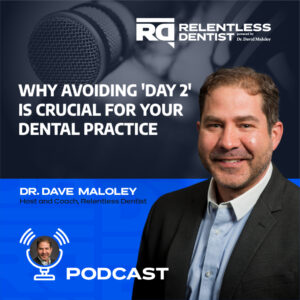 What if there’s a tried and tested philosophy that can be the key to unlocking extraordinary success in your dental practice for 2024?
What if there’s a tried and tested philosophy that can be the key to unlocking extraordinary success in your dental practice for 2024?
Unlock growth and elevate patient care with a game-changing philosophy inspired by Amazon’s success. Embrace continuous innovation, customer focus, and agility to transform your dental practice. Gain actionable insights for dynamic, agile decision-making that exceeds patient expectations.
In this episode, Dr. Dave delves into the transformative ‘Day One Philosophy’ and its surprising impact on dental practices:
- Innovate or Stagnate? Uncover how continuous innovation isn’t just a buzzword but a necessity for staying at the dental forefront.
- Beyond Treatment Plans: Explore the customer-centric approach that redefines patient experiences and skyrockets satisfaction.
- Agility: Your Secret Weapon? Find out how being agile in business can outpace competitors and secure your practice’s future.
- The Long Game in Dentistry: Learn why strategic long-term planning is crucial for more than just financial health.
- A Learning Culture: Luxurious or Essential? Discover the underestimated power of cultivating a learning environment in your team.
Tune in to unravel these compelling concepts and see how they can radically elevate your practice.
Take the next step towards transforming your dental practice. Complete the Dentists Ascend Quiz and book your exclusive Freedom Mapping Session with Dr. Dave. Limited to five dedicated dentists, ready for growth in 2024.
Key Quotes:
- ”Starting every day off with this day-one mentality has made a huge difference for me and my business and life over the last six months.”
- “Innovation is not just limited to your equipment and techniques. It includes improvements in your patient interactions, your office management, and marketing.”
- “Agility in business operations is essential for a dental practice… Being agile means embracing flexibility in your approach.”
- “Long-term strategic planning in your dental practice… involves goal setting and developing strategies to achieve these objectives over the next five, over the next 10, 15 years.”
- “Cultivating a learning culture within your dental practice… means encouraging continuous professional development for your team.”
Featured on the Show:
- People: Jeff Bezos, is an American entrepreneur and pioneer in e-commerce, best known as the founder of Amazon.com, Inc.
- People: Steve Jobs, was an American businessman, inventor, and investor, renowned for co-founding Apple Inc.
- People: Peter Drucker, was an Austrian-born American management consultant, educator, and author.
- People: Jim Collins, is an expert in business management, as well as company growth and sustainability.
- I appreciate your feedback. Let me know what you learned and loved here: [email protected].


by [email protected] | Dec 20, 2023 | Enthusing Clients
Podcast: Play in new window | Download
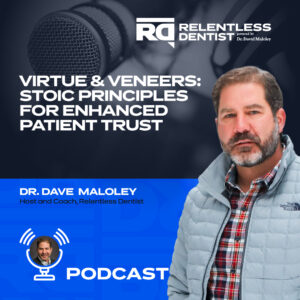 Can timeless wisdom from ancient Stoicism transform your modern dental practice?
Can timeless wisdom from ancient Stoicism transform your modern dental practice?
This podcast is more than just a history lesson; it’s a roadmap for integrating age-old wisdom into the heart of your dental practice, fostering a fulfilling and successful professional life.
In this episode, Dr. Dave explores the intersection of ancient philosophy and modern dentistry:
- Timeless Insights for Modern Care: Learn how integrating age-old wisdom enhances patient satisfaction and boosts referrals.
- Elevated Decision-Making: Gain insights into thoughtful treatment planning and improved patient outcomes.
- Deepening Trust with Patients: Discover powerful communication techniques rooted in philosophy to strengthen relationships and increase referrals.
Tune in now to learn how these enduring principles can significantly enrich your dental practice.
Take the next step towards transforming your dental practice. Complete the Dentists Ascend Quiz and book your exclusive Freedom Mapping Session with Dr. Dave. Limited to five dedicated dentists, ready for growth in 2024.
Key Quotes:
- “From the streets of ancient Athens to the broader realms of the Roman Empire, great thinkers crafted principles that still resonate powerfully in our practices”
- “We’re really only in control of four things: attention, our intention, our emotions, and our physiology.”
- “By cultivating a calm and composed mindset, amidst various stressors that happen every day in a dental practice, you can provide reassurance and exceptional care.”
- “Wisdom helps in understanding the comprehensive needs of our patients… Justice focuses on fairness and ethical practice.”
- “Stoicism offers practical tools for thriving in today’s fast-paced world.”
Featured on the Show:
- People: Brian Earl Johnson, is an associate professor of Philosophy at Fordham University.
- People: Ryan Holiday, is one of the world’s bestselling living philosophers.
- People: Marcus Aurelius, was a Roman emperor from 161 to 180 AD and a Stoic philosopher.
- People: Lucius Aeneas Seneca, was a Stoic philosopher of Ancient Rome, a statesman, dramatist, and in one work, satirist, from the post-Augustan age of Latin literature.
- People: Epictetus, was a Greek philosopher known for his work in Stoicism.
- People: Gaius Musonius Rufus, was a Roman Stoic philosopher of the 1st century AD.
- People: Marcus Porcius Cato, better known as Cato the Younger, was an influential conservative Roman senator during the late Republic.
- Book: Meditations, Marcus Aurelius
- I appreciate your feedback. Let me know what you learned and loved here: [email protected].


 Are you a dental practice owner ready to level up, but unsure where to start? What if the key to success lies in five proven strategies?
Are you a dental practice owner ready to level up, but unsure where to start? What if the key to success lies in five proven strategies?


 Do you want to be the go-to dental expert in your community? The kind of dentist do patients trust implicitly and rave about their friends?
Do you want to be the go-to dental expert in your community? The kind of dentist do patients trust implicitly and rave about their friends? Are one-on-one meetings with your team just another item on your to-do list, or are you maximizing the potential of one-on-one meetings in your dental practice? This episode is a deep dive into how these crucial interactions can be a game-changer for creating a self-managing, efficient, and growth-oriented team.
Are one-on-one meetings with your team just another item on your to-do list, or are you maximizing the potential of one-on-one meetings in your dental practice? This episode is a deep dive into how these crucial interactions can be a game-changer for creating a self-managing, efficient, and growth-oriented team. Are you a dental practice owner haunted by the fear of patient rejection? Are you ready to redefine your approach to rejection and unlock new levels of success in your dental practice? Let’s tackle the fear of rejection head-on.
Are you a dental practice owner haunted by the fear of patient rejection? Are you ready to redefine your approach to rejection and unlock new levels of success in your dental practice? Let’s tackle the fear of rejection head-on. Imagine you’re at a crossroads in your dental practice. How do you move from just being good to truly exceptional? Let’s unlock the secrets of thriving in the competitive world of dentistry.
Imagine you’re at a crossroads in your dental practice. How do you move from just being good to truly exceptional? Let’s unlock the secrets of thriving in the competitive world of dentistry. Are you a dental practice owner striving to stand out in a saturated market? What if the secret to success lies not only in your clinical skills but in something more, something often overlooked in healthcare? Imagine transforming your practice by embracing a hospitality mentality, where patient care goes beyond procedures, fostering genuine connections and unforgettable experiences.
Are you a dental practice owner striving to stand out in a saturated market? What if the secret to success lies not only in your clinical skills but in something more, something often overlooked in healthcare? Imagine transforming your practice by embracing a hospitality mentality, where patient care goes beyond procedures, fostering genuine connections and unforgettable experiences. Are you a dental practice owner struggling with hidden challenges within your team? Could the greatest threat to your practice’s success be internal, rooted in team dynamics?
Are you a dental practice owner struggling with hidden challenges within your team? Could the greatest threat to your practice’s success be internal, rooted in team dynamics? Are you unintentionally holding back your dental practice with old beliefs?
Are you unintentionally holding back your dental practice with old beliefs? What if there’s a tried and tested philosophy that can be the key to unlocking extraordinary success in your dental practice for 2024?
What if there’s a tried and tested philosophy that can be the key to unlocking extraordinary success in your dental practice for 2024? Can timeless wisdom from ancient Stoicism transform your modern dental practice?
Can timeless wisdom from ancient Stoicism transform your modern dental practice?